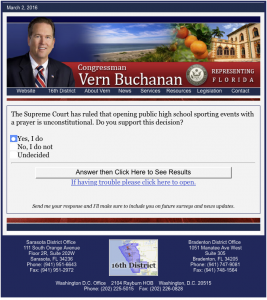Keep prayers out of public school
I received an email from Rep. Vern Buchanan (Republican from Florida) asking:
The Supreme Court has ruled that opening public high school sporting events with a prayer is unconstitutional. Do you support this decision?
I said yes. In fact, I called his office to tell him why. Had I not been compressing a message for one of his aides, here’s what I would have said:
I grew up in the school district where parents brought the suit, Engel v. Vitale, that resulted in the 1962 Supreme Court decision. I was twelve. I remember the cross-burning down the street from us when the results were announced.
The school had adopted what it considered to be a non-denominational prayer. There is no such thing. Even if there were, how one prays varies in different religions. Jews don’t kneel, clasp their hands, and bow. In fact, Jews don’t pray together in public places as part of their usual ritual. (Exception: Part of the Yom Kippur service entails kneeling.)
Not to mention that I’m an agnostic atheist, so I don’t pray. I remember availing myself of the option to sit quietly while the rest of the class said the prayer. Why would anyone think that that’s an acceptable option to give a kid? My school was half Christian and half Jewish, and it was a very tolerant place, so I didn’t feel ostracized. But I was lucky. “Starting a class with prayer tells a kid what’s normal.”Starting a class with prayer, and understanding that this is a school policy, tells a kid what’s normal. If you don’t pray, or don’t pray that way, how could a child not draw the conclusion that she or he is not a full-fledged member of the class?
I’ll be happy to reconsider these views when I hear about the first public school where the kids are mainly or entirely Christian that mandates starting the day by saying a “non-denominational” prayer that refers to G-d as “Allah,” and that requires the children to kneel while facing Mecca. Then maybe I’ll believe that the push for school prayer isn’t based on Christian assumptions.










